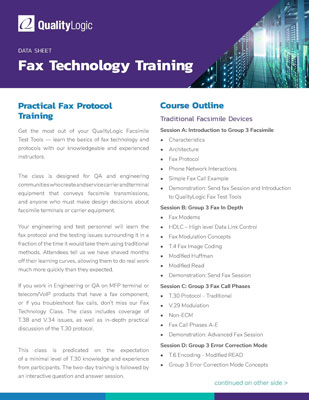Fax Technology Training
Learn about Fax Protocols and Fax Testing Issues
If you work in Engineering or QA on MFP terminals or telecom/VoIP products that have a fax component, or if you troubleshoot fax calls, don’t miss our next Fax Technology Class.
Learn Fax Protocols and Testing
Fax technology training gets your engineering and test personnel up to speed on the fax protocol and testing issues surrounding it in a fraction of the time traditional methods take. QualityLogic’s Fax Technology Training shaves months off your team’s learning curves. The course covers:
If you work in Engineering or QA on MFP terminal or telecom/VoIP products that have a fax component, or if you troubleshoot fax calls, don’t miss our next Fax Technology Class. Now, we’ve added coverage of T.38 and V.34 issues to the in-depth practical discussion of the T.30 protocol. A minimal level of T.30 knowledge and experience from participants is helpful. The primary target audience for this training is the engineering community who creates and services telecom and terminal equipment that conveys facsimile transmissions. It is also informative for anyone who makes design and/or marketing decisions about facsimile terminals or carrier equipment. The content is presented using a combination of whiteboard drawings, PowerPoint slides and the use of the QualityLogic fax test tools, FaxLab, DataProbe T30 Analyzer, and DataProbe T30-T38 Analyzer. Two-day open enrollment courses are periodically scheduled in Southern California, Asia, and Europe, or request a class at your site.
Fax Technology Training Outline
Day 1: Traditional Facsimile Devices
Session A – Introduction to Group 3 Facsimile
- Characteristics
- Architecture
- Fax Protocol
- Phone Network Interactions
- Simple Fax Call Example
- Demonstration: Send fax Session and Introduction to the QualityLogic Facsimile Test Tools
Session B – Group 3 Fax In Depth
- Fax Modems
- HDLC – High level Data Link Control
- Fax Modulation Concepts
- T.4 Fax Image Coding
- Modified Huffman
- Modified Read
- Demonstration: Send Fax Session
Session C – Group 3 Fax Call Phases
- T.30 Protocol – Traditional
- V.29 Modulation
- Non-ECM
- Fax Call Phases A-E
- Demonstration: Advanced Fax Session
Session D – Group 3 Error Correction Mode
- T.6 Encoding – Modified READ
- Group 3 Error Correction Mode Concepts
- Partial Pages
- ECM Fax Session Example
- ECM-Specific T.30 Signals
- T.30 Timeouts
- Demonstration: ECM Session Examples
Day 2: Extended Facsimile
Session E – 1993/2005 Extensions to G3 Facsimile
- Summary of 1992-3 Revisions
- New Fax Signals
- Document Transport Modes
- Higher Resolutions
- Summary of 1994-1997 Revisions
- Color Fax
- New Compression Methods
- Group 3 Digital Fax
- Summary of 1997-2000 Revisions
- New Resolutions
- Internet Fax
Session F – V.34 Fax
- Introduction to V.34 and V.8 V.34
- Fax vs. Traditional Fax
- Introduction – V.34 Features
- Half Duplex Fax Session Example
- Half Duplex Fax Summary
- Full Duplex Fax Summary
- V.34 Fax Summary
Session G – Facsimile Device Testing and Troubleshooting
- Test program planning
- Test process insights
- Troubleshooting
- Designing Robust Fax Devices
Session H – T.38 Internet Fax Introduction
- G3 fax –> Real Time IP Fax
- T.38 Standards Overview
- T.38 Protocol and Structures
- UDP Error Correction Methods
- Practical Issues: UDP vs. TCP
- T.38 Summary
If you work in Engineering or QA on MFP terminal or telecom/VoIP products that have a fax component, or if you troubleshoot fax calls, don’t miss our Fax Technology Class. The class includes coverage of T.38 and V.34 issues, as well as in-depth practical discussion of the T.30 protocol.
This class is predicated on the expectation of a minimal level of T.30 knowledge and experience from participants. The two-day training is followed by an interactive question and answer session. For a full course description download the datasheet below.
